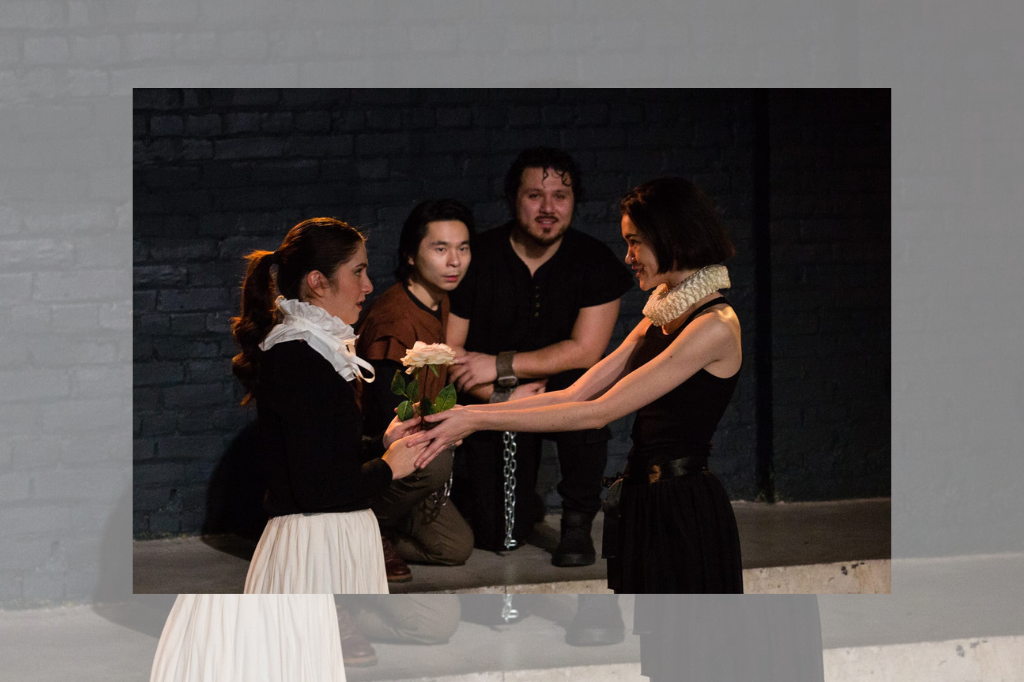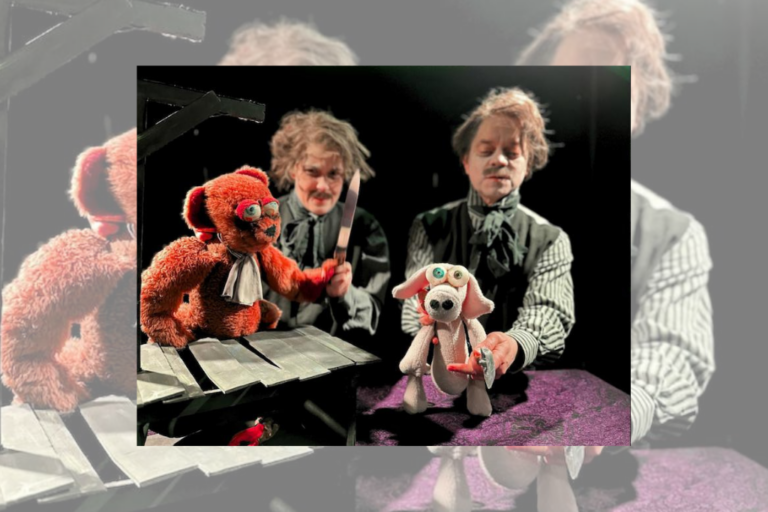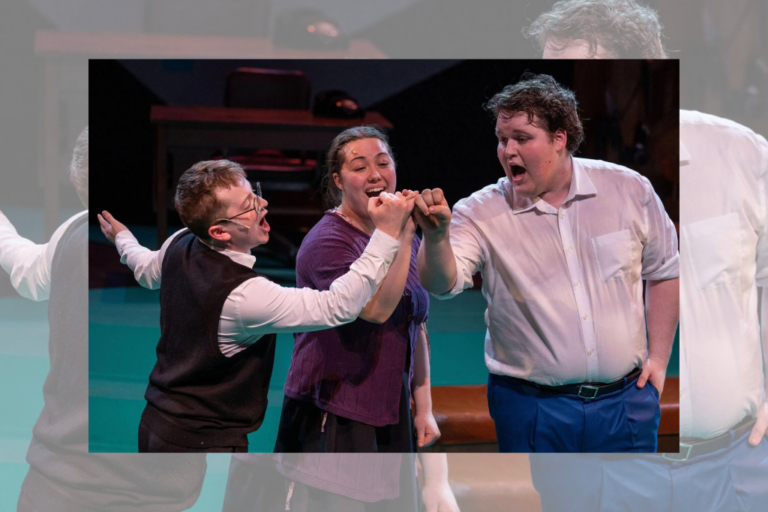REVIEW: Shakespeare BASH’d brings novelty to the Bard’s most under-produced work
Is it possible to watch Shakespeare without 500 years of baggage?
Maybe, if you’re seeing the Western world’s most famous playwright’s final effort written with John Fletcher, The Two Noble Kinsmen. Possibly best known for being confused with The Two Gentlemen of Verona, it’s a play that takes similarly lesser-known players in the mythological conflict between Creon and Theseus, filters those princely soldiers through Chaucer’s Canterbury Tales, and turns their story into a love triangle of epic proportions.
One of Shakespeare’s only under-produced works, Kinsmen likely and refreshingly comes with relative novelty to its audience. While the play is full of Shakespeare’s greatest hits and tropes such as banishments, disguises, and madness, it treads such familiar ground that it’s clear why it’s one of his oft-overlooked efforts. However, in Shakespeare BASH’d’s intimate, stripped-down production of the work, we discover why even lesser Shakespeare is still worthwhile in the ways it explores different kinds of love and desire, and the destruction that occurs when either becomes obsession.
The recessed stage of the BMO Incubator at The Theatre Centre allows the audience to sit either slightly above the action on three sides, or right on the stage area itself. You’re incredibly close to the action, to the point where a sword fight seems like a dicey proposition, and you might feel the need to tuck your feet under your chair. (The fighting, smartly choreographed by Jennifer Dzialoszynski, features lots of satisfying sounds of metal clashing against metal, but in reality comes nowhere near the danger zone.) The closeness of the experience goes a long way to breaking down the barriers caused by a combination of unfamiliar plot and always-dense Shakespearean language.
The company’s prioritization of text under director James Wallis also brings immediacy to the unfamiliar. It’s clear from the cast’s easy facility with the words and the natural emotion with which they speak that everyone knows exactly what they’re saying and why. That’s a good thing, because there’s a lot of plot to get through.
On the way to their wedding procession — apparently getting married once in A Midsummer Night’s Dream isn’t enough for these crazy kids — Theseus (Jeff Yung 容海峯) and Hippolyta (Melanie Leon) are interrupted by three queens (Madelaine Hodges 賀美倫, Breanne Tice, and Dzialoszynski) in matching flowing white skirts and black lace veils. (There’s no credited costume designer, but the cast does a lot with a little, using varied configurations of throat ruffs and suggestions of period costume over simple contemporary basics.) The keening queens successfully exhort Theseus to recover their husbands’ remains from Creon’s conquest of their lands; Creon, who you may remember from his role in myth as Antigone’s draconian uncle, has a real thing about refusing his enemies proper religious burial.
Theseus’ success in defeating Creon’s forces leads to collateral damage in the form of noble princes Arcite (Michael Man) and Palamon (Emilio Vieira), impressive warriors and dear cousins whose loyalty to their land forced them into the fight. Everyone’s swooning over the princes’ fine figures and bravery even as the pair are consigned to prison. Initially the closest of friends (and perhaps something more), the kinsmen don’t consider themselves truly imprisoned as long as they have each other — until first Palamon, then Arcite, spots Hippolyta’s sister Emilia (Kate Martin) outside in the garden, and each declares, “finders keepers!” Stunned by her beauty, the two men find their easy avowals of affection to each other quickly turning to paranoia, posturing, and death threats. It’s a plot that could be solved in 15 minutes if polyamory were acceptable, but since it isn’t, the conflict over the graceful Emilia rends the loving cousins apart swiftly and dramatically.
This is a play poised on a tripod, with triads behind all of the events in motion, from the love triangle to the three queens to the three lords each cousin is allowed to bring to the final contest. Notably, Theseus more than once only changes his mind after his adviser Pirithous (郝邦宇Steven Hao), otherwise a relatively extraneous character, joins Hippolyta and Emilia on bended knee.
Shakespeare and Fletcher return to this shape again and again, as if to suggest its stability as a fulcrum for action, love, and fealty, the base of an altar for prayer. When Palamon and Arcite begin to view the triangle as an enemy, they are lost. Director Wallis also emphasizes this shape in several crucial scenes, placing actors in triangular positions and the audience around three quarters of the playing space so we can see the other two sides of viewers.
In another nod to the triangle, in a beautiful opening scene, Palamon and the company lift Arcite up in a position that foreshadows either ecstasy or death. This moment is also the first of many highlights featuring the play’s “proto-queer” subtext, a reading helped both by the powerful chemistry between Man and Vieira — a scene where they carefully dress each other in armour before fighting crackles with sexual tension — and by the fact that the text is presented exactly as written without alteration, this subtext easily highlighted simply via a small gesture, glance, or smirk. It’s not a radical retelling; it’s just there, subtle and natural, a light shimmering atop the play’s depths.
Emilia echoes Arcite and Palamon’s easy, loving familiarity in her interactions with a female servant (Hodges 賀美倫) after declaring to Hippolyta that she does not think she could ever love a man. Though she admires both Palamon and Arcite, she engages with them as if through an invisible wall. Martin plays up Emilia’s lack of ability to choose between the kinsmen, mostly because choosing one would condemn the other to death, looking more and more lost as she radiates the nervous energy of a small caged animal.
Tears constantly threatening to shed, she visibly shakes in frustration with her unwitting role in a man’s conflict, shouting at Theseus as she’s forced to be a prize without agency from attention she never wanted. Her total lack of joy at her situation highlights the small tragedy of her life even beyond Shakespeare and Fletcher’s text. She’s mirrored by the story of the Jailer’s Daughter, whose love-induced madness for Palamon and “cure” is used more for comic relief, but who still has more agency than many of the era’s lower-class female characters. It doesn’t hurt, too, that Nish-Lapidus knows how to land a great one-liner.
The Two Noble Kinsmen rests uneasily in the tragicomedy realm, and neither the comedy nor the tragedy reach the heights of Shakespeare’s best. Because it’s so rarely performed, doing the whole text makes sense for the unique full experience, but there are sections that beg for judicious cuts to spare the butts of a modern audience. For example, Shakespeare goes to the “rude mechanicals performing for Theseus” well yet again in a protracted dance number with new, one-scene characters that’s nicely choreographed by Breanne Tice and well performed, but is far more tedious than brief.
The ending of the play, as well, feels almost an afterthought or postscript, too random to achieve the necessary heartbreaking symmetry and inevitability that causes a true tragedy to strike at the heart even hundreds of years after the writing. The company seems aware of this, playing up the comedy of the exit speech and effectively focusing throughout on the smaller, quieter tragedy of a close relationship irrevocably rent asunder.
It’s in those small, intimate moments where a company like BASH’d really shines, in this noble effort to give this quirky, slept-on Shakespeare its due.
The Two Noble Kinsmen closed at The Theatre Centre on February 4. You can learn more about the production here.
Intermission reviews are independent and unrelated to Intermission’s partnered content. Learn more about Intermission’s partnership model here.















Comments